All images courtesy of Jimmy Macbride
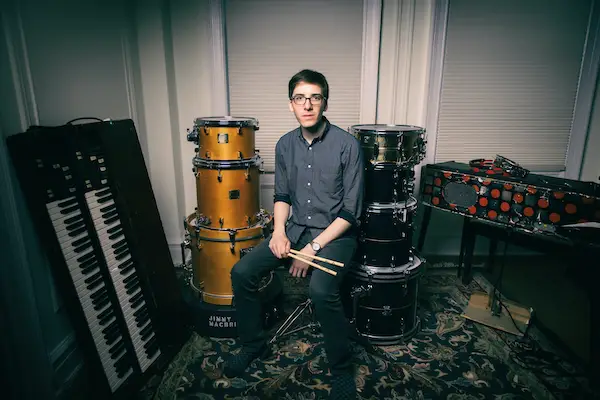
It’s currently a very exciting time in Jazz. There are a plethora of talented and unique musicians. Jimmy Macbride is no exception. He is one of the most versatile and hard-working drummers out there. It was a privilege to be able to speak with him. During our talk, we discuss the possibility of music output from Jimmy as a bandleader, how his approach as a sideman has enabled him to play so many different styles of music and how he was able to stay sane during the lockdown, amongst other things. Learn more about Jimmy below and on his website.
Joe:
So, what have you been up to this past year, considering the current state of the world?
Jimmy:
I’ve been in New York City, where I live. I have basically been here for the past year. At the start of the lockdown, there wasn’t really a whole lot going on. As with most other people, I spent a lot of time at home and adjusting to a new way of life. I’ll say it wasn’t the most productive time. I feel like I heard a lot of people saying, “I have so much free time. I can do all these things I never had time to do before.” For me, it was just kind of shocking. I’ve always been someone who likes being busy with things. Playing gigs and working and traveling. I wouldn’t say that musically this past year, I was a lot more productive or did many different things I wouldn’t normally do.
It felt like a long pause in my musical life. That is not to say I wasn’t practicing and playing the drums. My wife is a musician as well. We live together, and she’s a pianist. When the weather was nicer, we felt a little bit more comfortable. We started having a few people over to our apartment, and we would casually play some sessions. When I started playing those sessions, I started to feel engaged again. I’ve always drawn most of my inspiration, passion for playing, work ethic, and drive from playing music with other people. That’s really the joy of it for me. When that wasn’t around for so many months, it was hard to stay inspired to be honest. Just having some small outlets as the months went on, to play casually with people, was a really nice feeling. It was something I could look forward to. These small shows helped to keep my momentum going and help me settle into a groove.
I definitely spent time doing a lot of other things besides playing the drums. Listening to a lot of music. Spending time with my wife and my sister. Cooking a lot more with my wife. I also started learning how to speak Japanese because my wife is Japanese. Anything else that I can do to keep my mind active. However, some gigs around town are starting to pop up. So, I’m hoping that means things are picking up gig-wise. That’s basically a summary of what I have been doing.
Joe:
Do you have any new projects coming out in the future that you can talk about?
Jimmy:
Let’s see. Not anything of my own, but a couple of records that I’ve played on recently are coming out soon. One album is by this pianist named Steven Feifke. He lives here in New York. He has a big band that I have played and recorded with often over the past few years. So, that’s something to look out for. Another record is by this guitar player Nir Felder. It came out last summer. One last record I can think of is with a saxophonist named Troy Roberts. It also came out recently. None of my own stuff yet. I was only just starting to kind of think about that. I began to invest some time into that before the pandemic, but I have been holding off until I feel comfortable.
Joe:
That is a perfect lead-in to my next question. In preparation to speak to you, I was listening to all the albums that you played on. It was enjoyable to learn about other contemporary musicians that I didn’t know. I know that you’ve played on a lot of albums, over forty, I believe. There is one big question I have after listening to all those albums. When can we expect to have an album with you at the helm?
Jimmy:
I don’t know if I could say that that would be too soon. It is something that I have thought about. The second half of 2019 was the first time I ever led my own band on a gig in New York. It was the first step towards trying to build something as a bandleader. I’ll say that was a lot of fun. I had a couple of gigs at this club Smalls, in the West Village. The process of composing new music and then bringing that to people was a thrill. It was a great challenge. Taking on all the responsibilities that a bandleader has is a higher stress situation than I usually find myself in. I don’t experience that stress as a sideman, but those additional requirements make it more rewarding.
Getting to hear musicians that you love bring your music to life; there’s no feeling quite like that. It did get me thinking that eventually, I’d like to settle on a group of people that I like playing with. Be able to build a book of music and then record it. I know the recording process at this point, having played on a fair number of other people’s records. I also know that there’s always something to be learned every time you go into the studio. I think that recording my own work could add to that learning experience. I don’t know when that’s going to happen necessarily. I’m hoping as things start to open up more, I can get some more playing opportunities. Then I could think about booking some more gigs and getting some more reps. Once I have enough reps, I could think about recording something. Hopefully, it will be sometime in the next couple of years. We’ll see what life brings. Obviously, making any kind of record these days is an expensive proposition. That’s another side of things to consider. It’s definitely not off the table. It’s something I would like to do at some point.
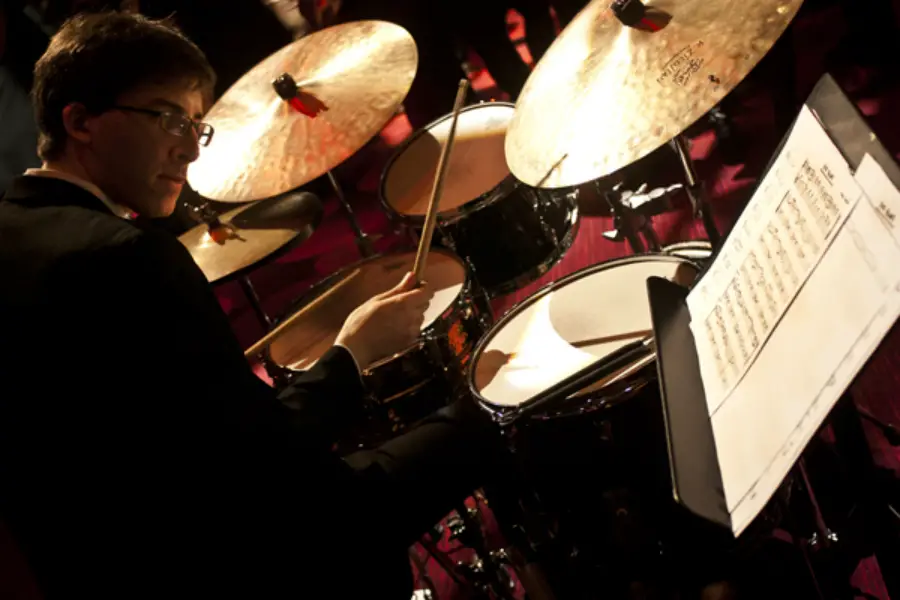
Joe:
Kind of going back to my last question. It’s incredible how many great albums you have already played on as well as the variety of Jazz. You have done everything from the Avant-Garde to Latin to classic Hard Bop. What has been your approach, as a working musician, that has enabled you to play on so many albums with such an array of sounds?
Jimmy:
I think having a great love for many different kinds of music is certainly part of it. Under the large Jazz umbrella, there are many different ways to play and different influences that people draw from. I would say that for me, it starts with trying to be open-minded. At the same time, balancing that open-mindedness with a unique musical identity. Being the kind of person who can fit in a lot of situations but always be me. All the great musicians that I admire throughout history exemplify that to me. So, I just always try to keep that attitude in mind. Hopefully, you can make any gig through practice and study and do what’s best for the music. All the values of listening, communicating, and supporting others should be present no matter what style is being played.
Joe:
What are your musical origins, so to speak? How did you get started with the drums and Jazz?
Jimmy:
Well, both my parents are involved in the arts. My dad was a Classical composer. He also taught for many years at the University of Hartford, teaching composition and music theory. My mom is a visual artist. So, I was surrounded by art growing up. Both my parents had a love for and helped turn me on to Jazz. This was especially true of my mom. She grew up here in the city and heard a lot of legendary musicians in New York. I think the first recordings I ever heard were cassette tapes of Frank Sinatra. I would listen to those tapes nonstop. I just loved the songs and the way the band sounded. That was kind of my initial introduction to music. Around the same time, I also gravitated towards playing drums for whatever reason. I was always just obsessed with the drums. From a young age, I started playing on pots and pans in the kitchen. My parents being artists, recognized that I had some sort of interest or affinity for music. They got me drum lessons with a local teacher, and it just took off from there. I used to go listen to whatever drummer was playing locally. Sitting by the drums and watching. As far as why I got into those things, I don’t really know. The only thing I can say is it was around, and I guess I was into it. I can tell you I haven’t lost interest in Jazz or the drums.
Joe:
Part of the uniqueness of the drums, I think, as an instrument is that there are so many ways to modify your set and get different sounds. Do you have a standard setup that you use? Has it evolved over the years, or do you have a different set based on the group you are playing with?
Jimmy:
Certainly, as time has gone on, I have settled more into knowing what I like. I have some preferences, but they are constantly changing. I like experimenting. Trying new cymbals or tuning the drums differently, or maybe setting them up a little bit differently. Sometimes that’s dictated by the music. Sometimes I find that doing that just presents some kind of new challenge—just a sonic space to create and bring new ideas. You don’t want to get stuck in one zone or in a rut. When I tune the drums differently, I’m just going to hear stuff differently. I’m always drawn to that aspect of the instrument. Through listening to music all the time, you discover other new sounds that you like. I try to emulate them and figure out what they were doing and why they choose to do that. So, that kind of all gets filtered in too. I’m always kind of looking for something new to stretch myself.
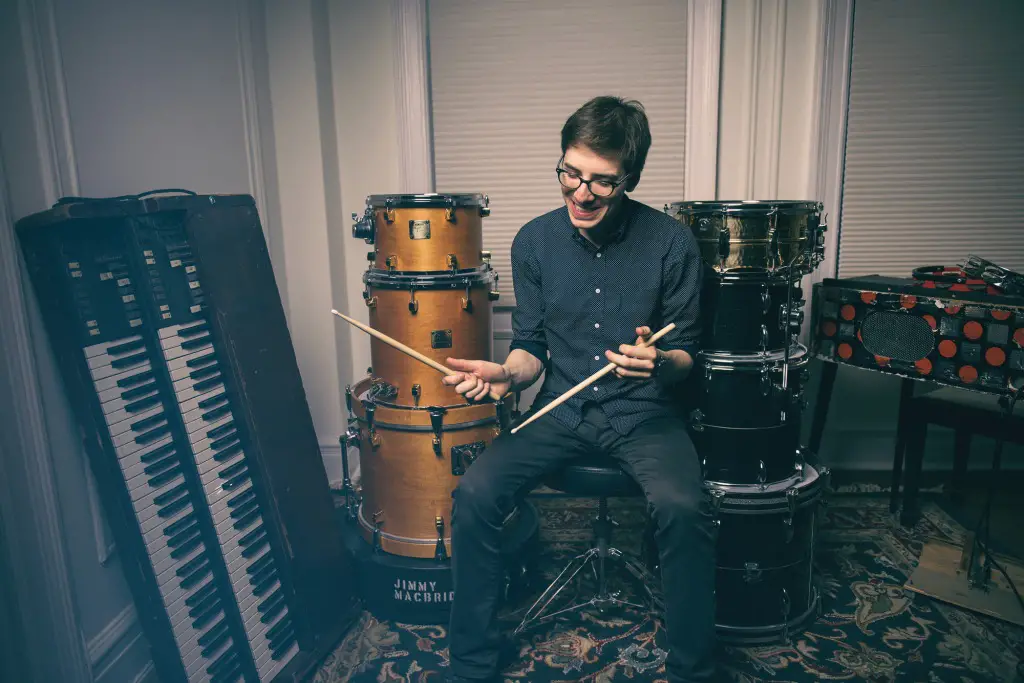
Joe:
Here is a fun one that I think you will enjoy. If you could make a modern-day version of one of those classic jazz drum battle albums, which drummer would you pick to do it with and why?
Jimmy:
You mean with me and someone else? Oh, wow. I don’t know. I guess that’s a funny question. I never even thought about it. First of all, it would be hard for me to really think of it as a battle. I don’t think that Gene Krupa, Buddy Rich, or Max Roach necessarily thought of it as a battle. I always saw them as a collaborative learning effort. So in that sense, I guess there are numerous people that I think would be fun to do that with.
I can think of one specific gig a few years ago that ended up being two drummers. It was with that guitarist Nir Felder. We were playing at 55 Bar. I was playing with this great drummer, Kendrick Scott. He is someone that I’ve always looked up to and drawn a lot of influence from. That was my first time playing with another drummer on a gig. Playing alongside another drummer, especially someone that I admire, like Kendrick, was one of the greatest learning experiences. When you’re the only drummer or the only person playing your instrument, I think it’s only natural to lose sight of how what you’re doing impacts the music. Playing alongside another drummer made that so clear. This is what it’s like to play with a drummer. This is what the drummer does for the music, especially such a great drummer as Kendrick.
So, that really opened my ears up to the kind of effect the drums can have. That certainly wasn’t a battle, you know. But I’d just liked playing off of what he was doing and vice versa. Ever since then, I’ve always thought I would like to do that again. Any number of people come to mind. Not necessarily one person, but I do believe that playing double drums has a lot of potential.
Joe:
Here is one we like to ask everyone. Do you collect and listen to any physical music formats, or do you mostly enjoy music digitally these days?
Jimmy:
I’m sure you can see my CD collection behind me. In the past couple of years, I finally got into vinyl as well. I bought a modest stereo setup, including a turntable. So, now I have some LPs as well. Buying new records and listening to them was something I really began to enjoy during the pandemic. So, yes, I do enjoy listening to vinyl, CDs, and digitally for the sake of convenience. I know it’s kind of a cliché to say, but to me, vinyl has become the best way to listen. It’s not only the sonic aspect of the music and being able to hear the details. It’s the ritual of listening to a record and putting it on a turntable. Dropping the needle and sitting down to look at the artwork and read the liner notes on the back. That’s something really great. It’s sort of an artifact of another time. It’s taking you to that time in a way that digital files just can’t. It’s something that I really enjoy and look forward to. I’ve kind of got bitten by that hi-fi bug. I’m excited to start building my record collection and learning more about it. I feel like it’s a great endeavor.
Joe:
I have one last question for you. What advice do you have for people that are aspiring to be career musicians?
Jimmy:
First of all, spend as much time around whatever musicians that you can. Look for experienced musicians that are near you. Every place has some kind of music scene. You don’t have to be in a big city like New York. Seek that music scene out and try to find the people who are involved in it. Learn from them and go hear them play as much as you can. Simultaneously, listen to as much music as you can and take note of the things that speak to you. Keep exploring because there’s so much out there.
I would say think twice about going to music school. It’s not necessary, and it’s costly. It’s a somewhat familiar refrain among people. I say that as someone that went to music school and got a lot out of my experience. I’m not knocking on school itself, but it is not essential to your success. The best part about school is it presents an environment in which you can start to get your feet wet and meet people and all that.
Hopefully, through the connections you cultivate, you will be able to make music yourself. Seek anybody out that wants to play and make music with them. Connect with others through that music because, ultimately, it’s a social experience. If you can play, your name will start to get out there. People will think of you and start recommending you for stuff. Honestly, just keep an open mind. Understand that no matter what stage of your musical life you are at, there’s always something more to learn. So, yeah, just stay open-minded and play as much as you can. Learn as much as you can, show up on time and be prepared. Those things are crucial. Professionalism is very important. If you can figure out how to put all that together, you’ll be cool.
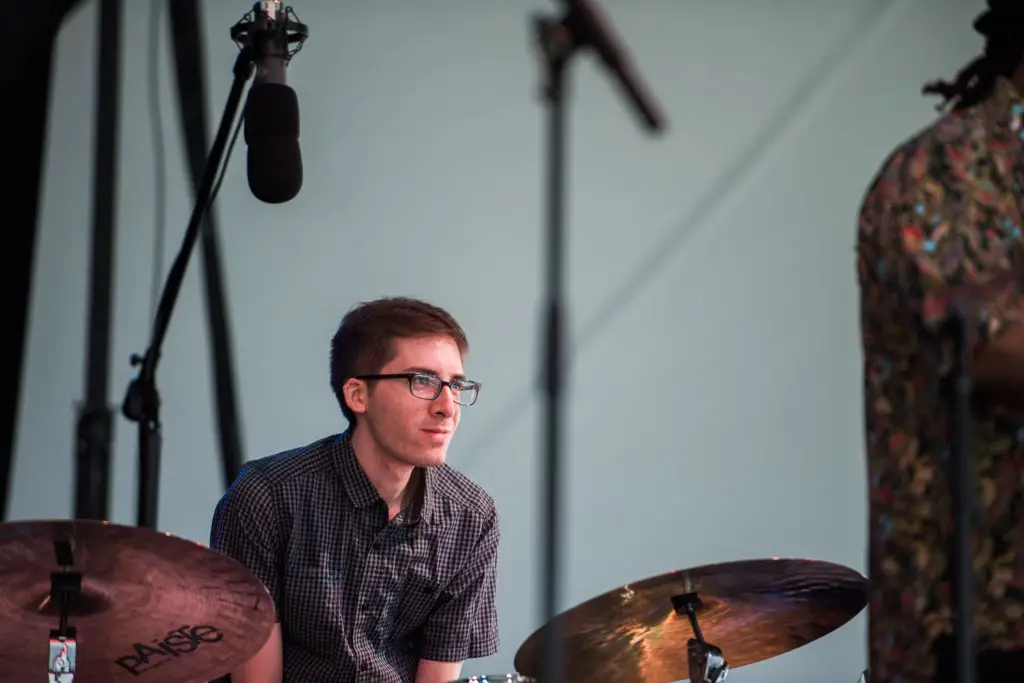
Interested in learning more about the artistry of Jimmy Macbride? Check out the link below:
Dig this interview? Check out the full archives of Records, Roots & Ramblings, by Joe O’Brien, here: https://vinylwritermusic.wordpress.com/records-roots-ramblings-archives/
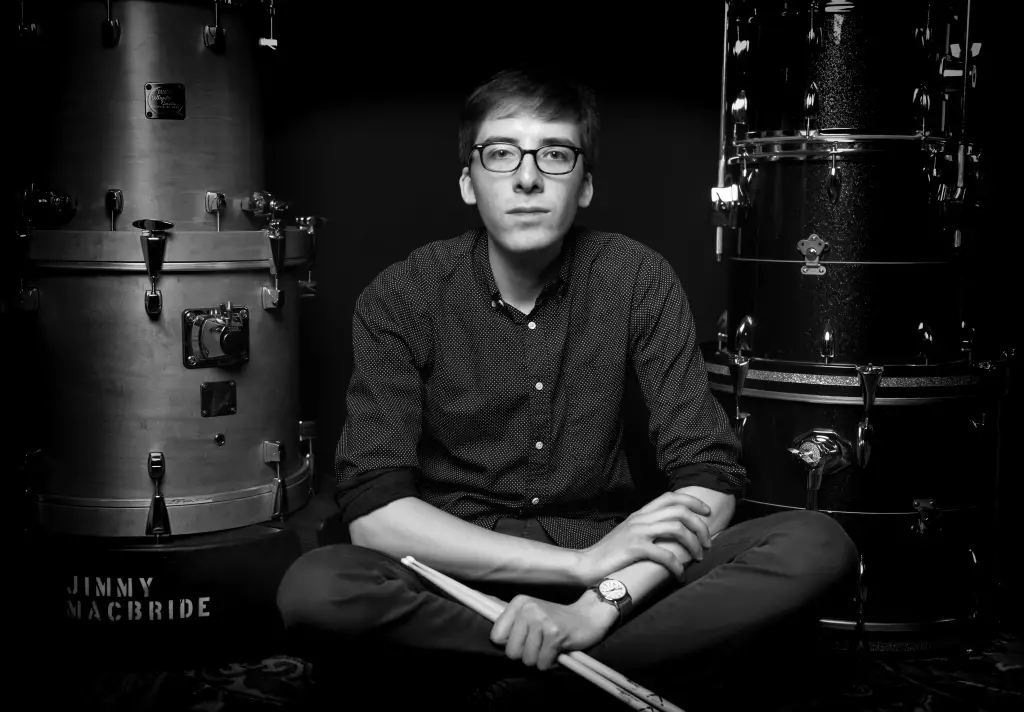




Leave a Reply